-
 Bitcoin
Bitcoin $83,958.5270
2.13% -
 Ethereum
Ethereum $1,879.4414
4.19% -
 Tether USDt
Tether USDt $0.9997
-0.04% -
 XRP
XRP $2.1265
2.78% -
 BNB
BNB $613.1925
2.97% -
 Solana
Solana $128.9499
2.16% -
 USDC
USDC $1.0000
0.00% -
 Dogecoin
Dogecoin $0.1729
5.20% -
 Cardano
Cardano $0.6780
4.58% -
 TRON
TRON $0.2347
1.44% -
 Toncoin
Toncoin $4.1190
4.91% -
 Chainlink
Chainlink $13.9593
5.21% -
 UNUS SED LEO
UNUS SED LEO $9.2071
1.10% -
 Stellar
Stellar $0.2694
2.45% -
 Avalanche
Avalanche $19.4424
4.37% -
 Shiba Inu
Shiba Inu $0.0...01288
5.66% -
 Sui
Sui $2.3684
4.54% -
 Hedera
Hedera $0.1680
4.79% -
 Polkadot
Polkadot $4.1834
4.17% -
 Litecoin
Litecoin $85.0611
1.17% -
 MANTRA
MANTRA $6.2987
1.18% -
 Bitcoin Cash
Bitcoin Cash $311.8968
4.75% -
 Bitget Token
Bitget Token $4.6724
4.34% -
 Dai
Dai $1.0001
0.00% -
 Ethena USDe
Ethena USDe $0.9997
-0.04% -
 Pi
Pi $0.7176
1.90% -
 Hyperliquid
Hyperliquid $13.8420
9.60% -
 Monero
Monero $217.8276
0.72% -
 Uniswap
Uniswap $6.1867
5.17% -
 Aptos
Aptos $5.3702
3.61%
How to solve the noise problem of mining equipment in FIL mining?
Filecoin mining's noise pollution can be mitigated by soundproofing enclosures, dampening materials, relocating to quieter areas, using quieter hardware, and optimizing mining operations for reduced fan speeds.
Mar 24, 2025 at 10:57 pm

Key Points:
- Understanding the sources of noise in Filecoin (FIL) mining.
- Implementing soundproofing solutions for individual mining rigs.
- Utilizing sound dampening materials and techniques.
- Exploring alternative mining locations to mitigate noise pollution.
- Considering quieter hardware and optimizing mining operations.
How to Solve the Noise Problem of Mining Equipment in FIL Mining?
Filecoin (FIL) mining, while potentially lucrative, often presents a significant challenge: the considerable noise generated by the mining rigs. This noise stems primarily from the powerful fans needed to cool the high-powered hardware constantly working to verify and store data on the Filecoin network. The whirring and humming can be disruptive, even unbearable, for those living or working nearby. This article explores various methods to effectively mitigate this noise pollution.
The first step in addressing the noise issue is pinpointing its source. Is the noise primarily from the hard drives, the cooling fans, or the power supply unit? Identifying the loudest components allows for targeted solutions. For example, a noisy hard drive might benefit from replacing it with a quieter Solid State Drive (SSD), though this could impact storage capacity.
Next, consider soundproofing your mining setup. This involves creating a barrier between the noise source and its surroundings. Several effective methods exist.
- Enclose your mining rigs in a soundproof enclosure. These pre-made or custom-built boxes use sound-absorbing materials to significantly reduce noise levels. Make sure the enclosure has adequate ventilation to prevent overheating.
- Use sound-dampening materials. These include acoustic foam panels, bass traps, and sound blankets. Strategically placing these materials around the mining rigs can absorb and diffuse sound waves.
- Isolate the mining rigs from the surrounding structure. Using vibration dampeners under the rigs can reduce noise transmission through floors and walls. This is particularly helpful if your mining operation is in a building shared with others.
Beyond soundproofing individual rigs, consider the location of your mining operation.
- Dedicated mining facility: Renting or building a dedicated space away from residential areas minimizes noise impact on others.
- Soundproof room: If you're mining at home, creating a dedicated soundproof room, even a small one, can make a huge difference. This often requires professional installation.
- Remote location: If feasible, placing your mining operation in a remote location with less stringent noise regulations can alleviate concerns.
Beyond physical solutions, optimizing your mining operation can indirectly reduce noise.
- Regular maintenance: Cleaning fans and ensuring proper airflow can reduce strain on components, leading to quieter operation.
- Overclocking: While tempting for higher returns, overclocking often increases fan speeds and noise. Stick to manufacturer-recommended settings unless you're prepared for increased noise.
- Quieter hardware: Invest in mining rigs designed with quieter components. Some manufacturers prioritize low noise levels in their products. Look for reviews and specifications before purchasing.
Finally, explore the use of noise-canceling technology.
- Noise-canceling headphones: While not addressing the source, these can be helpful for personal use in the vicinity of the mining operation.
Addressing the noise produced by FIL mining equipment requires a multifaceted approach. By combining soundproofing techniques, strategic location choices, hardware optimization, and potentially noise-canceling technology, you can significantly reduce the noise impact and maintain a peaceful environment.
Frequently Asked Questions:
Q: Are there any legal restrictions on noise levels from crypto mining? A: Yes, many jurisdictions have noise ordinances that limit the decibel levels permitted in residential and commercial areas. Check your local regulations before starting a mining operation.
Q: How much can soundproofing reduce noise levels? A: The effectiveness of soundproofing depends on the materials used and the implementation. It can reduce noise levels by 10-30 decibels or more.
Q: Is it cost-effective to soundproof my mining operation? A: The cost-effectiveness depends on the scale of your operation and the level of noise reduction desired. Smaller operations might find it more cost-effective to relocate, while larger operations might find soundproofing a worthwhile investment.
Q: Can I use everyday materials for soundproofing? A: While some everyday materials offer some sound absorption, they are generally less effective than specialized acoustic materials. Using inappropriate materials may even worsen the situation.
Q: What if my mining rigs still produce too much noise after soundproofing? A: If noise levels remain unacceptable after implementing soundproofing measures, consider relocating your mining operation to a more suitable location or explore alternative mining solutions.
Disclaimer:info@kdj.com
The information provided is not trading advice. kdj.com does not assume any responsibility for any investments made based on the information provided in this article. Cryptocurrencies are highly volatile and it is highly recommended that you invest with caution after thorough research!
If you believe that the content used on this website infringes your copyright, please contact us immediately (info@kdj.com) and we will delete it promptly.
- AB (formerly Newton Project) rebrands to target real-world asset (RWA) tokenization
- 2025-04-01 16:10:12
- Cryptocurrency Entrepreneur Chun Wang and a Team of 3 Astronauts Set Off on a Historic SpaceX Flight
- 2025-04-01 16:10:12
- Pi Network Continues to Struggle, Nearing a New All-Time Low
- 2025-04-01 16:05:12
- The memecoin hype is dying. Trading on pump dot fun is down by 94%.
- 2025-04-01 16:05:12
- Pi Network’s Price Plummets as Bearish Momentum Grows
- 2025-04-01 16:00:11
- Aptos (APT) and Sonic (S) Have Seen Notable TVL Growth, While Solana (SOL), Ethereum (ETH), and Arbitrum (ARB) Have Experienced Decreases
- 2025-04-01 16:00:11
Related knowledge
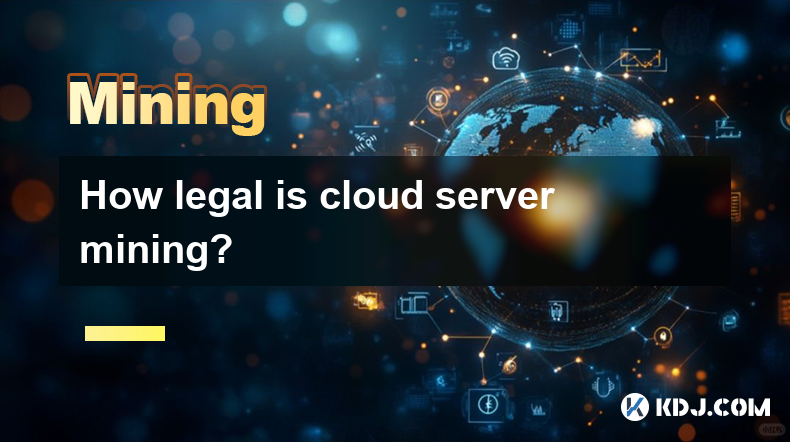
How legal is cloud server mining?
Apr 01,2025 at 08:08am
Cloud server mining has become an increasingly popular method for individuals and companies to participate in cryptocurrency mining without the need for expensive hardware and high electricity costs. However, the legality of cloud server mining can be a complex issue, as it varies by jurisdiction and depends on several factors. This article will explore...
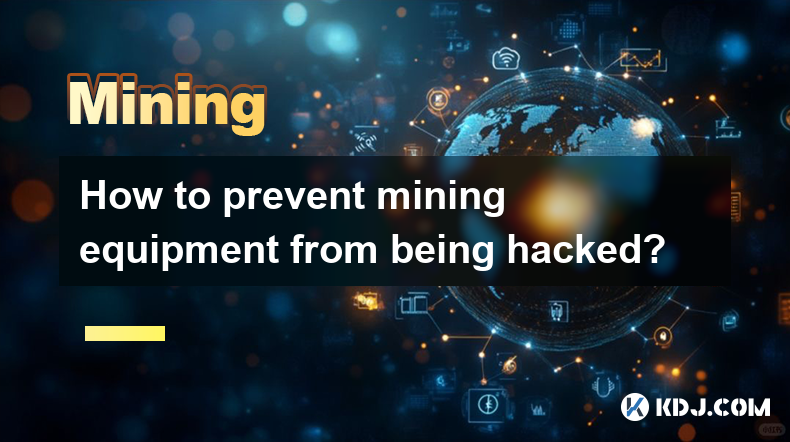
How to prevent mining equipment from being hacked?
Apr 01,2025 at 06:22am
Understanding the ThreatsCryptocurrency mining, while potentially lucrative, exposes your equipment to various cyber threats. These threats range from simple malware infections that steal your mining profits to sophisticated attacks that hijack your entire operation. Understanding these threats is the first step in effective protection. This includes r...
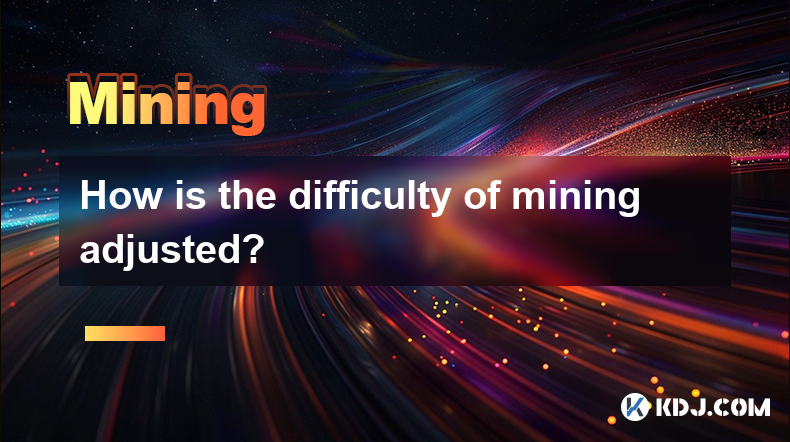
How is the difficulty of mining adjusted?
Apr 01,2025 at 07:14am
Understanding Bitcoin's Difficulty Adjustment MechanismBitcoin's mining difficulty is a crucial element ensuring the network's stability and security. It dynamically adjusts to maintain a consistent block generation time, approximately every 10 minutes. This adjustment prevents miners with overwhelming computing power from monopolizing block creation a...

Are the mining income affected by the mining pool allocation mechanism?
Mar 31,2025 at 05:49pm
Understanding Mining Pool Allocation MechanismsMining pools aggregate the hashing power of many miners to increase the chances of successfully mining a block. The reward for successfully mining a block is then distributed among the pool's participants based on their contribution – usually measured in shares submitted. The allocation mechanism determine...
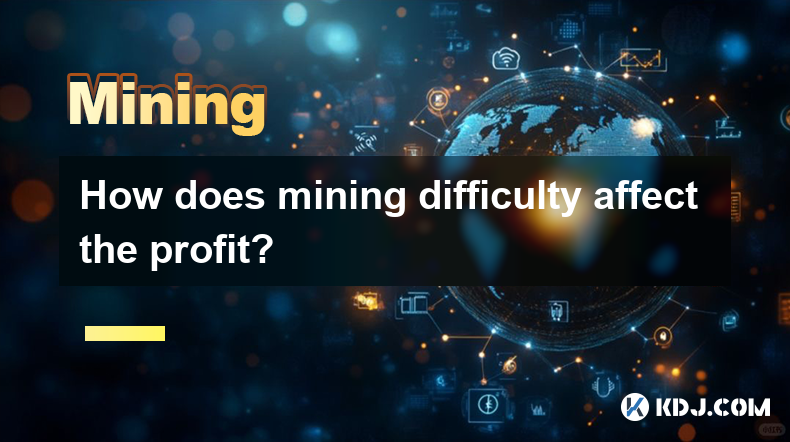
How does mining difficulty affect the profit?
Apr 01,2025 at 12:00pm
Understanding Mining Difficulty and its Impact on ProfitabilityMining difficulty in the context of cryptocurrencies refers to how computationally hard it is to solve the cryptographic puzzle required to add a new block to the blockchain. This difficulty is automatically adjusted by the network to maintain a consistent block time, typically around 10 mi...
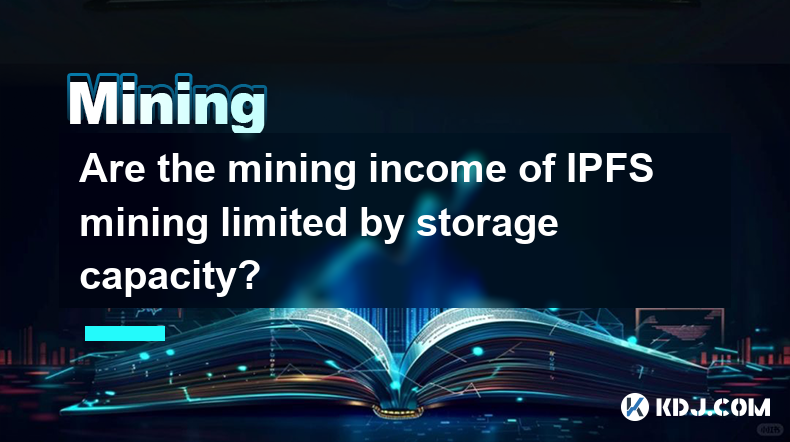
Are the mining income of IPFS mining limited by storage capacity?
Apr 01,2025 at 12:00am
Understanding IPFS Mining and its Revenue ModelIPFS (InterPlanetary File System) mining, unlike Bitcoin mining which relies on computational power, focuses on providing storage and bandwidth to the network. Miners earn rewards by making their storage available and contributing to the overall health and efficiency of the decentralized network. The amoun...

How legal is cloud server mining?
Apr 01,2025 at 08:08am
Cloud server mining has become an increasingly popular method for individuals and companies to participate in cryptocurrency mining without the need for expensive hardware and high electricity costs. However, the legality of cloud server mining can be a complex issue, as it varies by jurisdiction and depends on several factors. This article will explore...

How to prevent mining equipment from being hacked?
Apr 01,2025 at 06:22am
Understanding the ThreatsCryptocurrency mining, while potentially lucrative, exposes your equipment to various cyber threats. These threats range from simple malware infections that steal your mining profits to sophisticated attacks that hijack your entire operation. Understanding these threats is the first step in effective protection. This includes r...

How is the difficulty of mining adjusted?
Apr 01,2025 at 07:14am
Understanding Bitcoin's Difficulty Adjustment MechanismBitcoin's mining difficulty is a crucial element ensuring the network's stability and security. It dynamically adjusts to maintain a consistent block generation time, approximately every 10 minutes. This adjustment prevents miners with overwhelming computing power from monopolizing block creation a...

Are the mining income affected by the mining pool allocation mechanism?
Mar 31,2025 at 05:49pm
Understanding Mining Pool Allocation MechanismsMining pools aggregate the hashing power of many miners to increase the chances of successfully mining a block. The reward for successfully mining a block is then distributed among the pool's participants based on their contribution – usually measured in shares submitted. The allocation mechanism determine...

How does mining difficulty affect the profit?
Apr 01,2025 at 12:00pm
Understanding Mining Difficulty and its Impact on ProfitabilityMining difficulty in the context of cryptocurrencies refers to how computationally hard it is to solve the cryptographic puzzle required to add a new block to the blockchain. This difficulty is automatically adjusted by the network to maintain a consistent block time, typically around 10 mi...

Are the mining income of IPFS mining limited by storage capacity?
Apr 01,2025 at 12:00am
Understanding IPFS Mining and its Revenue ModelIPFS (InterPlanetary File System) mining, unlike Bitcoin mining which relies on computational power, focuses on providing storage and bandwidth to the network. Miners earn rewards by making their storage available and contributing to the overall health and efficiency of the decentralized network. The amoun...
See all articles























































































